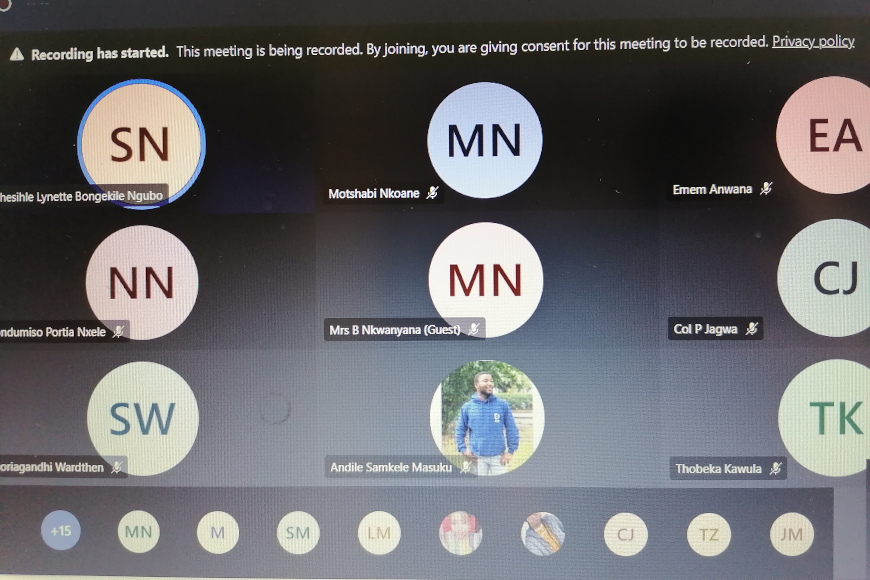In commemorating the 16 Days of Activism for No Violence Against Women and Children, the Department of Student Counselling and Health hosted a webinar on Substance Abuse and Human Trafficking on Microsoft Teams, last Wednesday, 25 November 2020.
Sister Soori Wardthen from DUT’s Health and Wellness Unit delivered the opening address where she urged the guests to engage and deliberate on activities to foster a collaborative effort in combating gender-based violence and femicide.
“Let us actively challenge practises in our homes, in our communities and in our society, that perpetuate gender inequality and abuse of women and children. As parents, let us teach children the values of gender equality. Let us also stop protecting abusers and report them. As the DUT community let us commit to support the 16 Days of Activism for No Violence Against Women and Children. Let’s work together towards a paradigm shift in addressing the intimate partner violence, sexual violence violation of our children,” she said.
The first speaker was Motshabi Nkoane, Social Work Policy Manager from the National Department of Social Development who spoke about Substance Abuse. She said she specialises in the programme development and implementation of substance abuse programmes.
“The Prevention and Treatment of Substance Abuse Act 70 of 2008 mandates us as the Department of Social Development to develop programmes aimed at reducing the demand and the harm caused by substance abuse.
The department decided to advocate for substance abuse at institutions through education and awareness campaigns after it was found out that there is a high level of substance abuse in colleges and universities. We came up with a campaign that aims to create a substance free environment through educational awareness programmes to students in order to inspire them to a healthy substance abuse free lifestyle,” said Nkoane.
She said the theme of the campaign is: Don’t Hang Your Dreams, Hang The Bottle of Drugs meaning students should not hang their education/studies but they must hang the bottle which is alcohol and drugs.
Furthermore, Nkoane raised concerns that alcohol at institutions of higher learning has become a ritual as students see it as an integral part of their higher education experience, which she said is a perception that needs to be changed.
“Many students who initiate drinking during the early days of campus life face the potential risk of excessive alcohol consumption which could lead to addiction. Drug and alcohol abuse is a public concern that is likely to result in serious health, social and academic problems, especially in universities and colleges. Its critical to know that everyone is affected by substance abuse, directly or indirectly,” said Nkoane.
She warned students about the dangers of smoking hubbly bubbly or hookah pipes, saying it affects the respiratory organs and being addicted to prescribed medicine that they usually use when studying for exams.
Speaking on Human Trafficking was Colonel Parmanand Jagwa, National Coordinator: Human Trafficking from the Directorate for Priority Crime Investigation.
Colonel Jagwa said human trafficking is the second most profitable organised crime commodity in the world. He said the person is recruited first especially via social media through deception, transported and then received which are the three issues they look at when dealing with human trafficking.
He said it is mostly women and children who are victims of human trafficking in exchange for money, for prostitution and pornography, also for forced labour and organ removals.
He stressed that this crime happens mostly behind closed doors making it difficult for law enforcement to detect it, as he said its highly profitable and people are in it for the money.
According to Colonel Jagwa traffickers get their victims addicted to alcohol and drugs in order to get control over them. He warned students to be careful when partying to watch their drinks to avoid possible spiking of drinks and should always go in groups.
Gender Based Command Centre’s Social Work Supervisor, Busi Nkwanyana said the centre was established as a response to issues of GBV, operating a 24/7 call centre facility where social workers are on standby for call taking and referrals. The centre’s emergency line is 0800 428 428, a toll free number. It also offers a Please Call Me facility when you dial: *120*7867# then a social worker will call you back. She urged GBV victims to speak out and seek help.
The last speaker was Sibusiso Mthethwa who spoke about Sexual Violation/Rape said its vital to groom young boys to be better men of tomorrow, to be men who do not rape, men who make informed decisions and not just told by friends what to do.
“Talking about sexual assault, to me we need to go back to the basics. We need to be mindful, as the public that you have your body and have the right over your body. Touching, taking photos of you naked without a concern, then you need to open a case. Through reporting that where you get justice and that’s where we can stop rape,” said Mthethwa.
Lastly, DUT’s HIV/AIDS Centre Manager, Thobile Zulu gave a vote of thanks to all the speakers for their educative presentations and taking time off their busy schedules to be part of this webinar.
Pictured: Some of the guests who attended the Substance Abuse and Human Trafficking webinar.
Simangele Zuma


